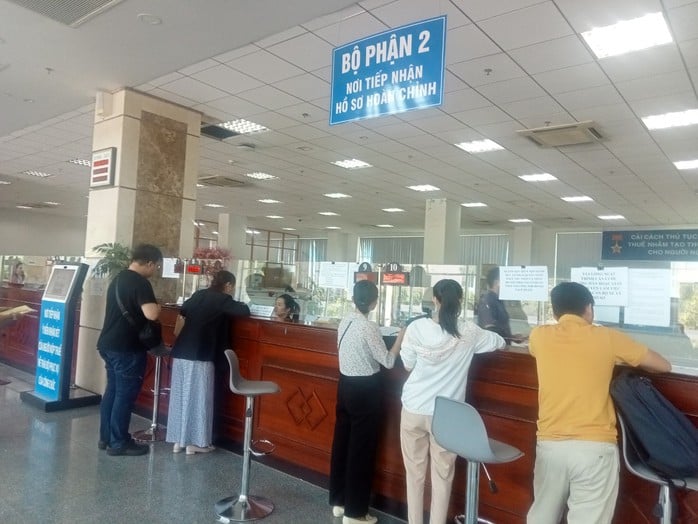
People transact at the Ho Chi Minh City Tax headquarters
The recent proposal of the Draft Law on Personal Income Tax (replacement) on real estate transactions is an example, showing the absence of "tax art".
Tax rates need to create consensus
Instead of just announcing it and letting everyone understand it, the drafting agency can propose a very low initial tax rate, clearly explain how it affects groups, how disadvantaged groups are supported and how taxes are redistributed..., through press conferences to create consensus in the community.
Only when people understand, believe and accept, will tax policy have the opportunity to become an effective tool to regulate and redistribute resources in society.
One of the most important factors affecting the economic efficiency of personal income tax is the marginal tax rate, that is, the tax rate applied to the additional income. When the marginal tax rate is too high, a large part of the additional income is taxed, reducing the benefits that workers receive from working overtime. As a result, individuals may choose to rest instead of working, or not invest in their careers, causing damage not only to themselves but also to the economy.
For example, a person who is receiving a salary of 50 million VND/month can increase it to 60 million VND/month if he works overtime, but if this additional income is taxed at 30%, the real benefit will decrease significantly and will no longer be attractive. In the long run, this can reduce the supply of high-quality labor and labor productivity of the whole society.
When individuals perceive that future income increases will be taxed at a higher rate, they may not pursue highly specialized careers, or they may shift to less taxed occupations. As a result, the economy loses a portion of its quality human resources.
There are three common ways to avoid personal income tax.
Another problem associated with personal income tax is tax avoidance – which is one of the common reactions of individuals when faced with high tax rates.
When the tax structure becomes too burdensome, individuals may seek to convert income into non-taxable forms such as gifts, fringe benefits, or report lower income than they actually earn. Some even turn to working in the informal sector to avoid being taxed.
These practices not only cause loss of state budget revenue but also undermine fairness and trust in the tax system.
All of the above impacts show that to ensure economic efficiency, personal income tax policy needs to be designed so that the marginal tax rate is not too high, especially in the upper middle-income group - the group with the potential to create great value for the economy.
In addition, the number of tax brackets should be sufficient to differentiate income groups to ensure fairness, but should not be too many to avoid complexity in calculation and declaration. The distance between tax brackets should be designed reasonably, avoiding the situation of too wide spacing, causing many people with different incomes to fall into the same tax rate.
If properly constructed, the new Personal Income Tax Law will not only help the State mobilize revenue in a sustainable manner, but also contribute to creating a healthy working, investment, and learning environment, helping the economy develop effectively, balanced, and in depth.
(Thy Tho wrote)
Source: https://nld.com.vn/thieu-vang-nghe-thuat-danh-thue-thu-nhap-ca-nhan-196250725120506713.htm


![[Photo] General Secretary To Lam, Secretary of the Central Military Commission attends the 12th Party Congress of the Army](https://vphoto.vietnam.vn/thumb/1200x675/vietnam/resource/IMAGE/2025/9/30/9b63aaa37ddb472ead84e3870a8ae825)
![[Photo] Solemn opening of the 12th Military Party Congress for the 2025-2030 term](https://vphoto.vietnam.vn/thumb/1200x675/vietnam/resource/IMAGE/2025/9/30/2cd383b3130d41a1a4b5ace0d5eb989d)
![[Photo] The 1st Congress of Phu Tho Provincial Party Committee, term 2025-2030](https://vphoto.vietnam.vn/thumb/1200x675/vietnam/resource/IMAGE/2025/9/30/1507da06216649bba8a1ce6251816820)

![[Photo] President Luong Cuong receives President of the Cuban National Assembly Esteban Lazo Hernandez](https://vphoto.vietnam.vn/thumb/1200x675/vietnam/resource/IMAGE/2025/9/30/4d38932911c24f6ea1936252bd5427fa)
![[Photo] Panorama of the cable-stayed bridge, the final bottleneck of the Ben Luc-Long Thanh expressway](https://vphoto.vietnam.vn/thumb/1200x675/vietnam/resource/IMAGE/2025/9/30/391fdf21025541d6b2f092e49a17243f)

































































































Comment (0)